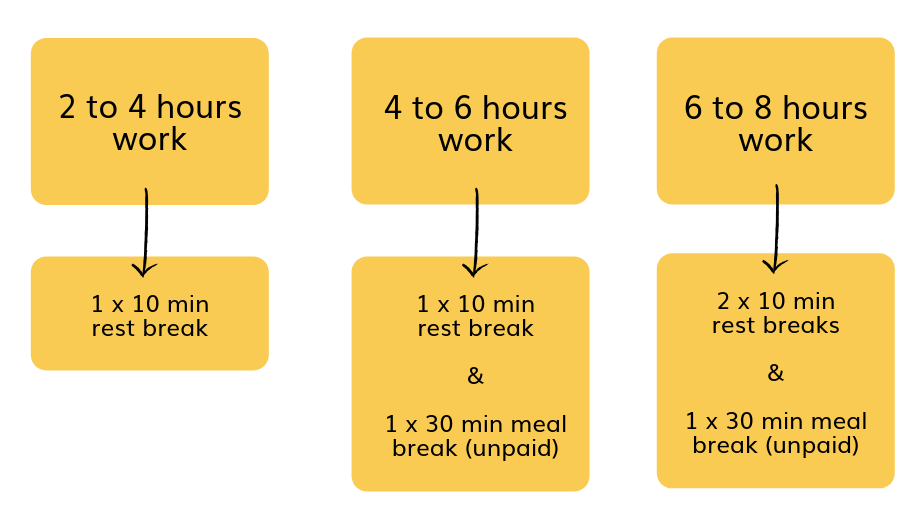Many took advantage of the Easter and Anzac public holidays to take a break and get some distance from work. Threes weeks later and all of this may seem like a distant memory now. You may have even cracked a giggle or two last weekend to keep spirits high – may the fourth be with you!
The days are getting cooler and shorter. So how do you keep your people productive and engaged during the winter months? And did you know the rest and meal breaks rules changed last Monday? This may make having fun and downtime at work easier for some.
So let’s start with how we use our time at work
Workplace rest and meal break entitlements
Rest and meals breaks are no longer as fluid and flexible as they once were before Monday last week. Employees must have the following breaks based on their hours of work for the day:

The same pattern follows for overtime and subsequent hours of work should the person be working greater than 8 hours per day.
The time of day these breaks happen, can still be mutually agreed between employees and employers. It is only when you can’t agree, that you have to follow the timings outlined in the legislation.
The catch to these changes are (there is always a catch!) employees who have a regular arrangement to forego breaks so they can finish early, no longer have this flexibility. Also paying compensation to employees for not taking breaks is restricted to those who provide essential services.
The intention of this legislation is to provide employees with breaks and time away from work during the day. We all know that we are better at what we do after a break or change of focus for a period. We make better decisions and can act quicker under pressure when we are well rested. Irrespective of whether it is an informal or formal arrangement, foregoing breaks to finish early is technically not in keeping with the intention of the legislation.
I can hear the groans and sighs already from employers, managers and employees … more compliance and rules! Yes it is, but there is good reason for it and it presents a challenge for employers to rise up to and overcome.
What to do about these changes?
Our advice is to do the detective work and understand how breaks are used in your workplace. What arrangements are in place already? Are these formal or informal? Do you have people stressed at work and working long hours? Why is that?
Quietly, find out what is happening now before you start taking action and setting rules about how and when breaks are taken. These questions and the answers you seek, should be part of a bigger conversation about productivity and culture.
So let’s talk productivity!
Those who work long hours without breaks or a laugh, do they do their best work?
Now when we talk work, we are not just talking about the documents written, widgets made or the houses built, we are also talking about the interactions and communication people have with one another during the day. If I haven’t had a break to refresh my focus, some difficult conversations or meetings don’t go as well as they could have. I also have moments of brain fog mid-afternoon or early evening if it has been a long day with little downtime.
I have also worked with people, who, when they haven’t eaten for a long period and live off caffeine, have a hangry impatient version of themselves appear. On one occasion, I can recall someone leading a planning meeting got hangry and the meeting was bought to a quick awkward conclusion. Because of the way it ended, a follow up meeting had be held as some attendees couldn’t recall the actions or priorities that were discussed. Talk about wasted time.
Most of us can relate and may even groan at the thought of being in a 4-5 hour meeting or training session without a break. So let’s get smarter about how we use our time and make taking a break worth it and enjoyable.
Every workplace and person will be different in their views of breaks and how they would like to spend that down time. The key is to offer flexibility and education. Flexibility in the way people spend break time or their downtime without judgement or opinion. Then educate on why it is important to have breaks and how they can be more productive at work.
Usually the first thing people complain about or fear when the word break is mentioned, is that they won’t achieve as much as they would if they were to keep working.
If the employee or manager thinks this to be true, then education is the first place start. There are a number of studies across workplaces and sports that prove rest and regular downtime is imperative to quality performance and outputs. It also key to reducing stress and promoting mental-wellness.

This leads me into Culture
What is fun and enjoyable at your workplace or home can be quite different to another.
Going for a walk, making a phone call to a loved one or playing around with a photo phone app can all be done in 10-30mins, and are not related to work. A lot of fun can be had over a lunch break or rest break when you let it. But when we say fun, we are mostly talking about culture.
A healthy culture is the glue that holds teams together, retains great employees, and lowers overall turnover. Low turnover usually helps the profit and loss. A business that is a healthy workplace is where fun is a byproduct of their culture. If you are not a Star Wars fan, then chances are Star Wars is not a topic of conversation at work and you would have not sent an email funny or joined in on the social media banter on May 4th.
Need help with understanding breaks and all these recent rule changes?
Responding to change and consolidation is the theme for Stapleton Consulting clients in 2019.
If you haven’t reviewed your agreement terms, policies and procedures for a while, or if after a quiet review of how breaks are taken, you realise you need some help with change then give us a call.
Our agreements, policies and procedures are written in way that makes it easy to understand, as it is in your language and has your branding on it. We also provide training and support to implement new agreements and policies with your people. A recent case involving Vodafone not applying its own policy to a complaint meant it was on the back-foot from the get go.



